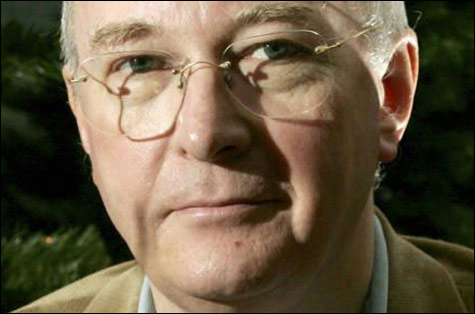Philip Pullman’s fantasy novels are condemned as a crash course in militant atheism. But one BU professor thinks otherwise.

CROSS TO BEAR: Philip Pullman is the author of The Golden Compass, the first installment of the fantasy trilogy His Dark Materials.
|
It is a truth now well established that the idea for a series of books about a schoolboy wizard did
not, in fact, originate with its author, J.K. Rowling (as she has naively claimed), but was piped up red-hot and stinking from Below. I believe it was Father Gabriele Amorth, chief exorcist of Vatican City and honorary president-for-life of the International Association of Exorcists, who opined in his characteristically urbane and lighthearted way that “behind Harry Potter hides the signature of the king of darkness, the Devil.”
Father Amorth has not yet made known his views on the work of British fantasist Philip Pullman, but when he does, we can expect an epigram. Because if Rowling, ladling out her friendly hocus-pocus, is a sort of lunch lady for Lucifer, then Pullman — whose The Golden Compass has its movie version released this week — is headmaster in the school of Hell.
In Pullman’s million-selling His Dark Materials trilogy, of which The Golden Compass is the first installment, religion — under the hard-to-miss name “the Church” — is cast as the cosmic foe of all knowledge and goodness. As Lyra and Will, the young heroine and hero, voyage across the dimensions toward self-discovery, the shadow of priestcraft falls long and black across them: vicious Rome-ish hierarchies — the Magisterium, the General Oblation Board — chase them around. Homicidal priests undergo rites of “pre-emptive penance.” Ex-nuns consult the I Ching. Gay angels make war on Heaven.
And in the trilogy’s final scenes, a crumbling and senile God is tipped off His throne and blasted into atoms by His own insignificance. Getting the hint, the Catholic Herald pronounced the books “far more worthy of the bonfire than Harry Potter. . . a million times more sinister.” Catholics in particular have been taking His Dark Materials rather personally, but the Anglican Peter Hitchens — heavier-footed brother of atheist gadfly Christopher — also rose lumberingly to the challenge when he named Pullman “the most dangerous author in Britain.”
Dead God, Oxford quad
Pullman himself, meanwhile, has coolly returned fire in op-ed pieces, interviews, and lectures, emerging as an agile and hard-headed apologist for a universe without God. Raised in an Anglican household, he found religion falling away from him in adolescence: “It began to seem impossible,” he told one interviewer, “to reconcile the creation story with the scientific account. It became increasingly implausible that life continued after the body died. The claims of some religions — the assumption of the Virgin Mary into Heaven, the infallibility of the Pope — seemed to me such howling nonsense.”
A former schoolteacher, Pullman lives in Oxford, England, but scorns the university town’s illustrious heritage of fantasy writing: C.S. Lewis is for him a pitiful reactionary, while J.R.R. Tolkien’s The Lord of the Rings he has called “infantile.” (Both of these men, not incidentally, were committed Christians.) This past year, with the children’s poet Michael Rosen, Pullman produced an educational DVD for kids aged 11 and up called Why Atheism? in which recovering former believers air their views. He is, in a word, not fucking around.
Or is he? What if this straight-up instructor in godlessness, whose confirmed intention is to winkle out the last trace of piety from the minds of his readers, turned out in the end to be a sort of cutting-edge Christian theologian? What if Pullman’s puncturing of the ecclesiastical gloom were actually just a healthy, crap-clearing way of allowing the real God to shine through? Enter the very charming Donna Freitas, 35-year-old assistant professor of religion at Boston University and co-author of Pullman exegesis Killing the Imposter God: Philip Pullman’s Spiritual Imagination in His Dark Materials (Josey-Bass).
“What I think is so amazing about Pullman,” says Freitas, “is that he’s doing feminist theology, he’s doing liberation theology, and he’s doing it gorgeously. And 12 million people have bought this trilogy! What a wonderful way to open their eyes to all of these underdog theologies, and to let them know that this stuff has been around for years — they just haven’t been told about it.”
Freitas and co-author Jason King are not the first to claim a buried religiosity for Pullman: no less august a figure than Archbishop of Canterbury Rowan Williams has praised His Dark Materials for the raising of questions that are “extraordinarily deep,” going on to say that he would not hesitate to recommend the books to children. And Pullman’s professed literary heroes are John Milton and William Blake, Christians both, though with their own twist on things — Twistians, perhaps we should call them.